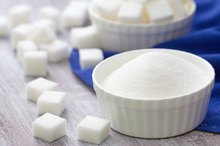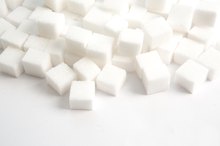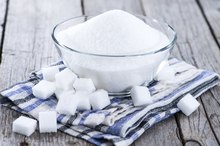Natural Fructose Vs. Artificial Fructose
There's a significant focus in the popular media on the role of fructose in health. For instance, you may have heard that high-fructose corn syrup is bad for you and might wonder whether that's because the fructose is "artificial" as opposed to "natural." Actually, there's no difference between artificial and natural fructose.
Fructose
Fructose is a sugar closely related to the more common sugar glucose. They have the same chemical formula — C6H12O6 — and both taste sweet. Your cells can use either for energy, and while fructose tastes significantly sweeter than glucose, each contain 4 calories per g consumed. One common source of fructose is fruit, but you will also find fructose chemically bonded to glucose to make sucrose, which is the chemical name for table sugar.
- Fructose is a sugar closely related to the more common sugar glucose.
- One common source of fructose is fruit, but you will also find fructose chemically bonded to glucose to make sucrose, which is the chemical name for table sugar.
Natural Vs. Artificial Fructose
Which Sugars Does Carob Contain?
Learn More
There's no chemical difference between "natural" and "artificial" fructose; the molecules are absolutely indistinguishable from one another, have identical properties and act identically in the body. Most "artificial" fructose — which might more appropriately be called industrially-produced fructose — comes from using enzymes to convert glucose into fructose. "Natural" fructose, which occurs in foods, is made by the cells in those foods in the same way; it's converted over from glucose.
Fructose And Health
Many studies suggest fructose, especially in large quantities, is not a healthy component of diet. For instance, ScienceDaily.com reports that fructose-containing drinks can increase triglyceride levels, which isn't heart-healthy 1. Similarly, a 2004 study in the "American Journal of Clinical Nutrition" by Dr. George Bray and colleagues suggests that increased fructose consumption could play an important role in the rising rate of obesity in industrialized countries 2.
Sources of Fructose
The Side Effects of Truvia
Learn More
While there's mounting evidence to suggest that high-fructose corn syrup isn't a healthy sweetener, it is not because the fructose in the corn syrup is industrially-produced that makes it a problem; eating large quantities of naturally-produced fructose would have the same effect. One major difference between naturally-occurring and industrially-produced fructose is that the former is not found in nature in high concentrations, while the latter is added to most processed foods, making it pervasive and difficult to avoid, potentially leading to some of its role in promoting obesity.
Related Articles
References
- ScienceDaily: Fructose-Sweetened Drinks Increase Nonfasting Triglycerides In Obese Adults
- "American Journal of Clinical Nutrition"; Consumption of High-Fructose Corn Syrup in Beverages May Play a Role in the Epidemic of Obesity; George Bray, et al; April 2004
- Popkin BM, Hawkes C. Sweetening of the global diet, particularly beverages: patterns, trends, and policy responses. Lancet Diabetes Endocrinol. 2015;4(2):174-186. doi:10.1016/S2213-8587(15)00419-2
- New Hampshire Department of Health and Human Services. How much sugar do you eat?. Updated August 2014.
- DeSilver D. How America's diet has changed over time. Pew Research Center. Updated December 13, 2016.
- Lakhan SE, Kirchgessner A. The emerging role of dietary fructose in obesity and cognitive decline. Nutr J. 2013;12:114. doi:10.1186/1475-2891-12-114
- Djiogue S, Nwabo Kamdje AH, Vecchio L, et al. Insulin resistance and cancer: the role of insulin and IGFs. Endocr Relat Cancer. 2013;20(1):R1-R17. doi:10.1530/ERC-12-0324
- Page KA, Chan O, Arora J, et al. Effects of fructose vs glucose on regional cerebral blood flow in brain regions involved with appetite and reward pathways. JAMA. 2013;309(1):63-70. doi:10.1001/jama.2012.116975
- Goran MI, Ulijaszek SJ, Ventura EE. High fructose corn syrup and diabetes prevalence: a global perspective. Glob Public Health. 2013;8(1):55-64. doi:10.1080/17441692.2012.736257
- Walker RW, Dumke KA, Goran MI. Fructose content in popular beverages made with and without high-fructose corn syrup. Nutrition. 2014;30(7-8):928-35. doi:10.1016/j.nut.2014.04.003
- American Heart Association. Added sugars. Updated April 17, 2018.
Writer Bio
Kirstin Hendrickson is a writer, teacher, coach, athlete and author of the textbook "Chemistry In The World." She's been teaching and writing about health, wellness and nutrition for more than 10 years. She has a Bachelor of Science in zoology, a Bachelor of Science in psychology, a Master of Science in chemistry and a doctoral degree in bioorganic chemistry.









